- Post
- #548560
- Topic
- Carrie Fisher is 50 today
- Link
- https://originaltrilogy.com/post/id/548560/action/topic#548560
- Time
Yes, Frink can empathize. When he was 55, he didn't look even that good. But that was sooooo long ago...
Yes, Frink can empathize. When he was 55, he didn't look even that good. But that was sooooo long ago...
Gene Luck Pickerd
Nothing to do or too much to do?
And packing heat?

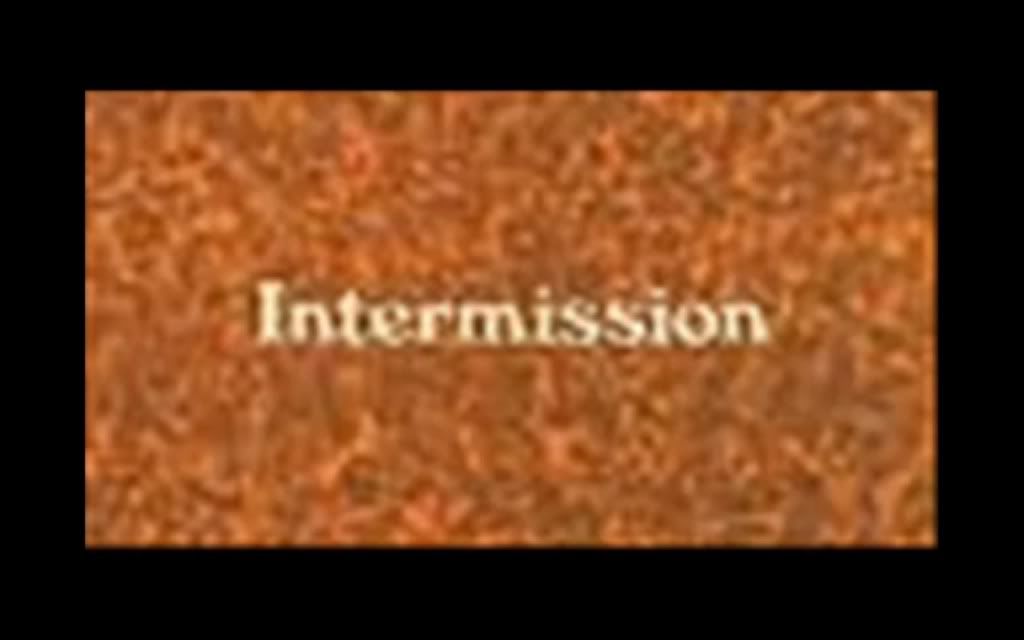
Okay, I suspect this thread is on its way out, which is good because I am probably going to have to pledge to limit myself once again very soon, and because this thread had been very time consuming for a while there. However, I had one more thing I really wanted to share before this thread enters semi-retirement (it will of course still be a place where anyone can post questions, but I will not actively seek any responses and I believe most people's curiosity has been settled for the time being).
I am a big fan of books, especially religious books. The following pictures are of my religious books. We recently bought another shelf and they're getting reorganized, so they're not necessarily in the order I like, and this isn't even all of them (I could get about two more shelves loaded for you). This is a sample to show you how much I study this. Now I'd be lying to say I've read all this, but I've certainly looked through them and read many and at least used those not read as reference material.
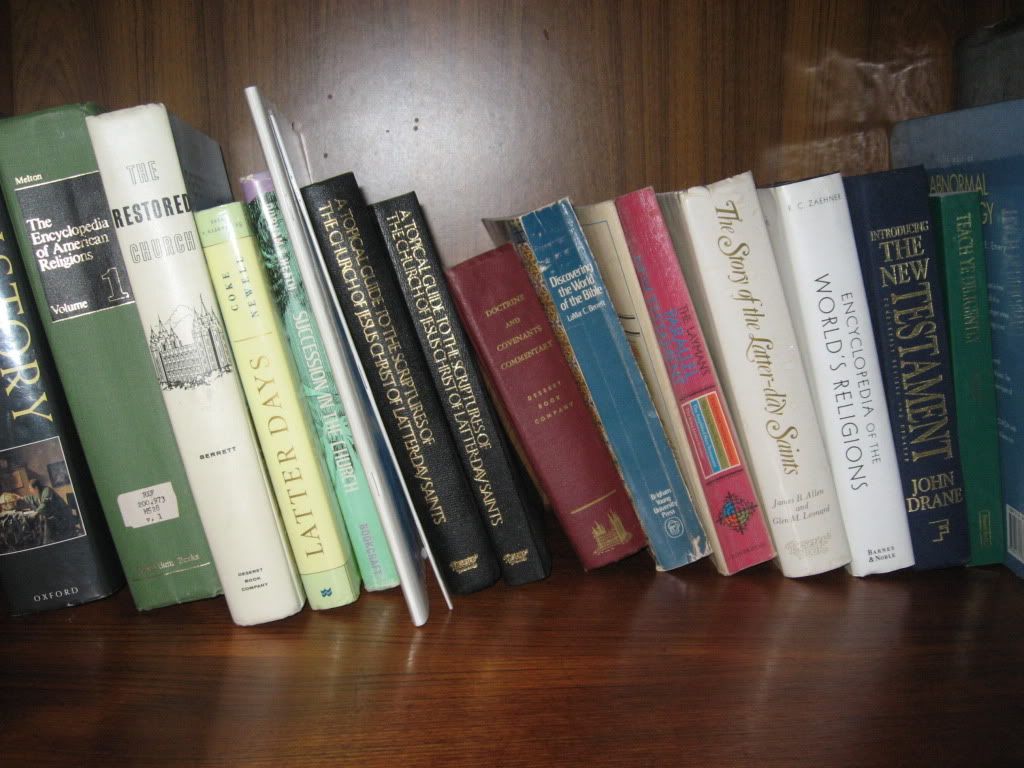
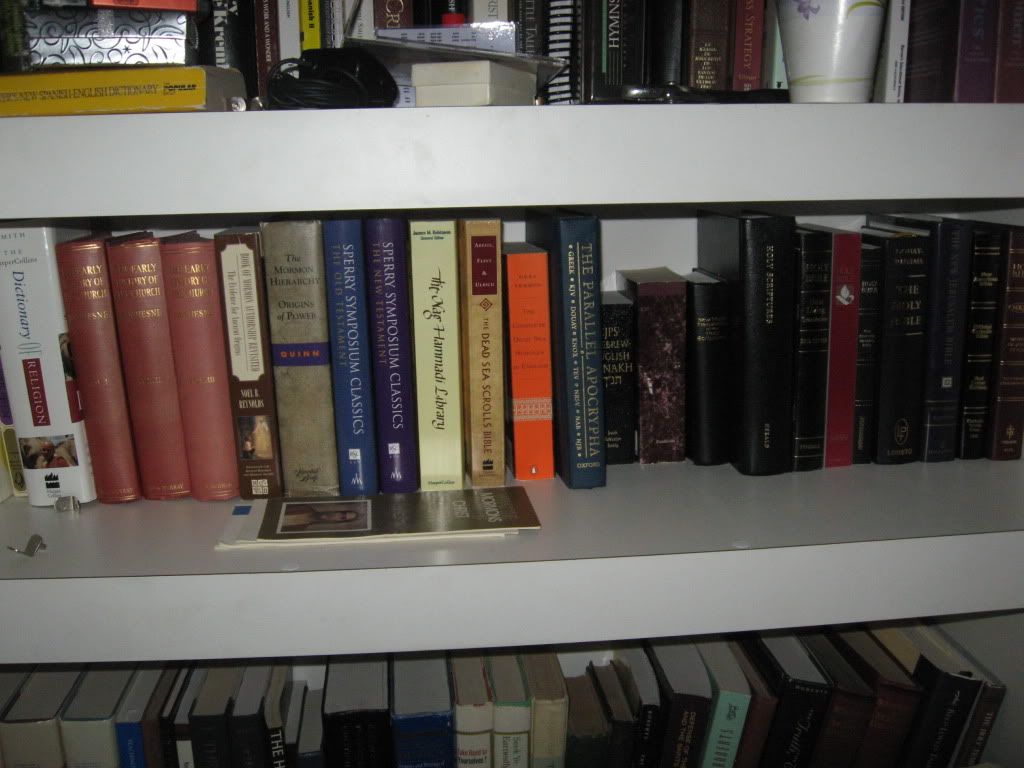
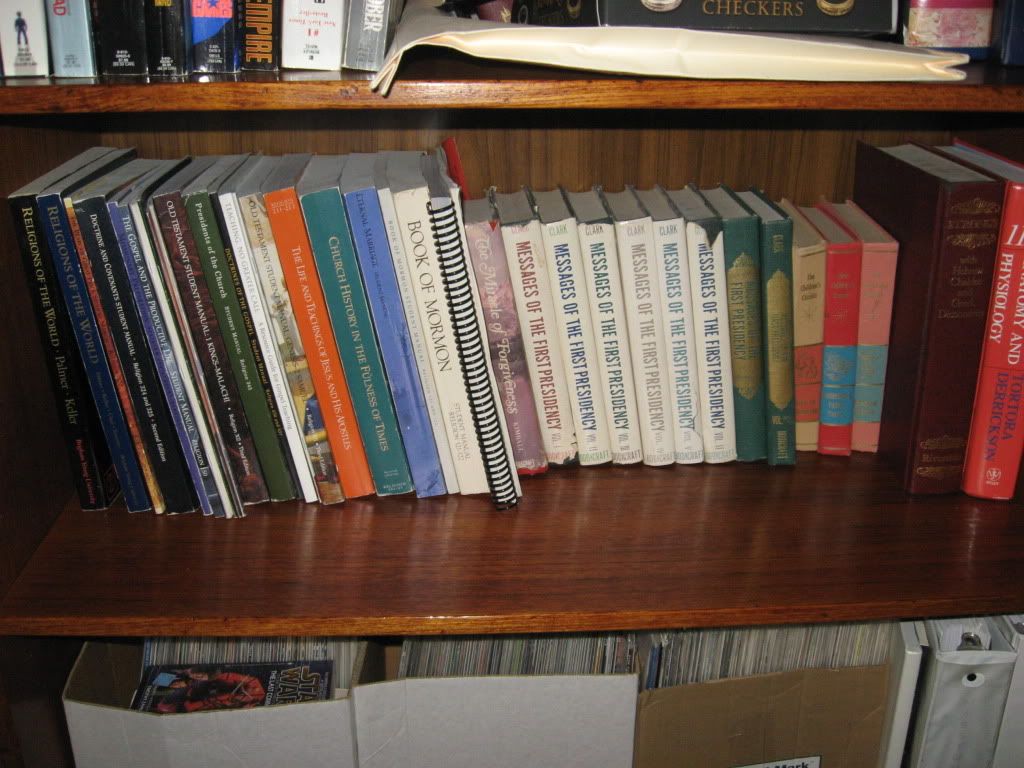
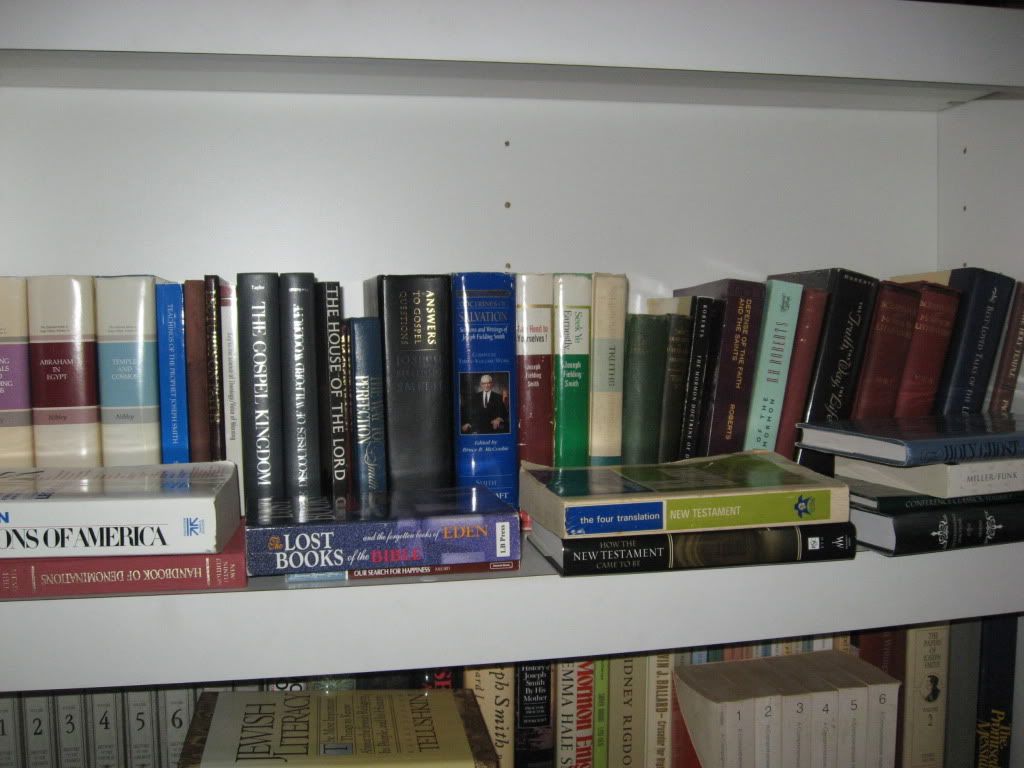
I'm a little disappointed at the fact that I don't seem to have made available my Mormon Doctrine collection by Bruce R. McConkie. While the name sounds authoritative, McConkie was chasatized for his first edition's tone and inaccuracies. He made several changes to reduce the offensive nature of his work when releasing his second edition, but he also did not change many things specifically criticized by Church leaders in his first edition. He later released a slightly revised second edition, which is the version most know today. The first edition is usually pretty valuable and goes for around $300 on eBay at times, though I've seen rarer printings go for more and damaged versions go for much less. I happen to have one of the damaged versions, which I obtained for $150. I have the second edition and the revised second edition as well. That's a collection I'm proud of.
I have nearly a complete set of the Messages of the First Presidency as well, shown in the third photo. The complete set usually goes for $450-$600 on eBay. I have volumes 1-5 (missing 6), plus two duplicates (2 and 5). The best part is that while individual books can be priced as high as $75, especially the rarer volumes 4-6, I have gotten all my books including duplicates for no more than $40 total. That's why I love thrift shopping :)
The fourth photo shows my Joseph Fielding Smith, Jr. (great nephew of prophet Joseph Smith and 10th prophet, and in his earlier years served as the Church Historian and Recorder. He wrote quite a few books on doctrine from a very faith-based perspective. Next to him I have my B.H. Roberts collection. He served as a Seventy and wrote the History of the Church and the Comprehensive History of the Church (first is a collection of documents edited together, second is more of an analytical synopsis), as well as several other books. He wrote from a much more scientific and critical angle, and really provided an intellectual and analytical perspective of the Church and its doctrines. These are two of my favorite Church authors, and they were contemporaries who did butt heads at times.
Finally, I have a collection of several different translations of the Bible, including Catholic, Protestant, Jehovah's Witness, scholarly, and Jewish translations (shown in second photo). I also have a copy of the "Inspired Version," a very offensive edition to most non-Mormons as it contains what we call the Joseph Smith translation. Smith altered many passages in the King James Bible in order to provide what we believe may be a more accurate rendering of some things. I use cautious wording here, as this is not simply a matter of actual translation. His work could be called more of a commentary, explanatory, expansive, clarifying, and at times correcting work. To give a minor example, the Bible says in Matthew that Jesus' robe was scarlet while John describes it as purple. Smith altered the scarlet to purple for consistency, presumably by us because this is the correct color, and significant in that purple is the color of royalty. Our official Bible is the KJV for several reasons, but the Joseph Smith Translation serves as a resource at times. This could be useful for those offended or interested in order to learn more on the topic.
As I said, this is not all. I also have a collection of works for other religions, such as two copies of the Qu'ran, Baha'i sacred texts, and other works. Especially interesting to me are the groups that claim adherence to a truer form of the faith revealed to Joseph Smith, such as the before mentioned Community of Christ, some things related to the ever-popular fundamentalist sects that practice polygamy and make the news more often than we do, and most interesting to me, the Strangite sect. The Strangites believe that James J. Strang should have succeeding Joseph Smith instead of Brigham Young, and make a very interesting case. There are even schismatics among this branch, and all membership in the whole world of all branches total less than 1,000 members, but they've never vanished despite ongoing pressure. They are a very interesting group.
All in all, I feel very qualified in my religious knowledge for an amateur on the topic. I really would have loved to major in religious studies. In any case, I wanted to show off about 70% of my collection for fun. Thanks for peeking, and thanks for all who have been interested in this thread. I hope that ultimately I have settled some of the confusion, although it appears the tea thing will forever be a stumper. I also hope that I have reduced a number of misconceptions, reduced any prejudice, and have not completely alienated any of you towards my faith. It really is a beautiful faith despite its human shortcomings. Remember, in any human institution, even divinely inspired ones, man's fingerprints will always reduce its perfection. Nevertheless, I truly believe that this is God's Church.
I won't have time to explain the uses of tithing myself, but know that the money is used in very particular ways and does not line the pockets of our leaders, though the highest leaders who do not have full-time jobs receive some modest support. It's apparent that none is exactly wealthy and that the money is not used for personal gain. Hopefully this link will help:
http://lds.org/ldsorg/v/index.jsp?locale=0&sourceId=e141f73c28d98010VgnVCM1000004d82620a____&vgnextoid=bbd508f54922d010VgnVCM1000004d82620aRCRD
(see the last two links under "Additional Online Materials" for the most straightforward information)
TV's Frink said:
Q: What's with the mandatory 10% donation thingy*?
Ah, tithing: a mandatory tax on Church members that if not paid, back payments will be collected through our collection agency, as well as heavy fines. Oh wait, that's not it.
Tithing is a voluntary payment of 10% with quite a lot of biblical precedent. Though one is expected to pay in order to be permitted to enter the temple, one will not be punished for not paying or be required to catch up if he/she goes through a phase without paying. Tithing is a matter of blessings. We pay it because it indeed tries our faith, but the Lord promises blessings. See Malachi 3:8-10 as a support for our belief in its benefits. This is also something I can attest to personally.
When my wife and I were first married, we did not have much money. We lived in a crappy apartment in a dangerous part of Tucson while I was attending the U of A, and unexpectedly early on, my wife got pregnant. We felt unprepared for this, and could not afford anything larger than our two bedroom apartment. It was hard to have the faith to pay our tithing, but we did so anyway. Shortly after, a job opportunity managing apartments opened up. The owner preferred to hire Mormons, though he was not one himself. We received free rent in a two bedroom apartment and free utilities, plus $800 a month on top, which was a huge step up for us. It also had well-priced benefits. We felt extremely blessed, and shortly after about three weeks working there and five months into our pregnancy, our OB/GYN performed the ultrasound to determine the baby's sex, and was surprised when she had to determine the babies' (yes, plural) sex. She had somehow not noticed for 5 months that my wife was carrying twins. We could never have supported both children in our dinky apartment, and with only me working, since my wife would have to stay home. I was able to continue to go to school and work while my wife stayed home working and watching the kids. You may call this blessing coincidental or karma, but we see it as a blessing for obedience to the law of tithing. We sacrificed for the Lord, and he was happy to give more in return.
Speaking of the twins, I've got to put them to bed right now, but later I will try to address the use of tithing, as we have lay clergy.
TV's Frink said:
Incidentally, this looks like an interesting website:
http://mormonthink.com/introductionweb.htm
And I particularly enjoyed this:
What if we're wrong?People wonder what if by some chance the Church is 100% true, and that there is some sort of fantastic explanation for all the historical problems - would God punish us in the next life?
God gave us a brain and expects us to use it. We're expected to use every means at our disposal to seek the truth and to live our lives in a desirable way. "The Glory of God is intelligence" is something we hear at church all the time.
If the LDS Church is somehow 100% true, we're not too worried about defending our beliefs on judgment day. If we end up 'on trial' for not believing what the LDS Church has taught, the information on this website alone would justify our actions.
We would ask God to explain the following:
- Why doesn't Joseph Smith's translation of the facsimiles in the Book of Abraham and the Egyptian papyri match what Egyptologists say they mean?
- Why does the Book of Mormon mention so many things that did not exist in the Americas when the BOM took place such as horses, elephants, wheat, barley, silk, steel, etc.?
- Why were we told the Book of Mormon was translated from gold plates that were never used, when Joseph put his face in a hat and looked at a common stone he found while digging a well?
- Why did Joseph marry 11 men's wives while they were still married to their husbands?
The lists of questions would go on for several pages. If God does indeed exist, and he's the fair judge that we all believe him to be, then how could He condemn anyone for not believing a story fraught with so many problems?
Likewise if the church isn't true, then I don't think a just God would punish anyone for believing in it if they really believed it, although perhaps some people would be chided for IGNORING the red flags and continuing to believe a lie out of fear or willful ignorance. If the church isn't true then it does not have the power to 'save' you anyway.
LDS people would probably have the same response if, in the next life, they found out that Scientology was really God's one, true church. They would bring up the absurd problems with that religion and expect absolution for not believing in that religion.
According to LDS lore, Joseph Smith himself will have some role in the final judgment of our souls. Shortly before he died, Joseph said "no man knows my history; if I hadn't lived it I wouldn't have believed it myself." Well, if even Joseph wouldn't have believed it, then how can anyone blame us for not believing it either?
That looks like a pretty cool site. There are also good points in this quote, though I'm surprised that some of the "questionable" things they bring up are not easily explained, even by genuine objective historians. Let me give an example: David Whitmer, one of the Three Witnesses to the authenticity is quoted as stating that Joseph Smith put his face in a hat to translate the Book of Mormon. But other sources, particularly later sources indicate that the translation process was done in different methods, including simply using the plates and no assistive device. Check out this link for more info. The same goes for other claims, and if you want, I can point out the flawed mentions. What's interesting to me is that there are other more serious poitns that could have been made, so I'm not trying to simply make excuses. They really could have used better examples. I myself appreciate their mission in spite of the crises of faith it can cause for many. I feel I've had to reason through many things to arrive at my point, and now I find myself a stronger believer in spite of realizing how much I don't understand.
walkingdork said:
darth_ender said:
Yeah, I understand. I just don't want our "unconventional" ideas to completely define us and I wanted to throw that in there before the thread entirely lost its steam.
But that's the problem, we are defined by what makes us unique.
Well, what's interesting is that the distinction between Baptists, Methodists, and Presbyterians is nearly insignificant today, though they came from some drastically different roots. But even these 13 Articles of Faith contain unique doctrines, some not laid out so specifically, but very important, such as the aforementioned distinct beings: The Father, the Son, and the Holy Ghost.
I did start this thread to answer the questions that tickle everyone the most, but it occurred to me that the image being conjured was something more akin to scientology (like the Kolob discussion). These things are present, but again are not particularly important to us. A non-LDS Christian who attends one of our services for the first time would find things that are certainly different from what they experience in his or her own services, but at the same time, it would definitely be a church service, not a Star Trek convention. It would certainly feel familiar to them in spite of its differences.
I understand your point, and I'll continue to happily share our wackiest traits or misconceptions. I just thought it would be wise to lay down what the base of our religion truly is.

Yeah, I understand. I just don't want our "unconventional" ideas to completely define us and I wanted to throw that in there before the thread entirely lost its steam.
I worry that this thread may have provided a bit of an improper perspective of my Church because most of the questions asked dealt with rather tangential topics that were not core aspects of my faith. I'm sure they are greater interest to most because they are either major sources of criticism or simply are distinctive aspect, but I feel that I should say that most of those things are not core doctrines, and most of them are seldom talked about. Yes we believe them, but they are not essential to our understanding. The following are our Articles of Faith, probably the closest equivalent we would have to a creed, confession, or catechism, though truly none of these. They are copied directly from our primary website and explain the most important teachings (though there are a few things that could have been added, such as the resurrection, eucharist, etc.) These really do sum up what is truly important to understand, and if one seeks clarification or depth, you may ask. I am always happy to answer.
1 We abelieve in bGod, the Eternal Father, and in His cSon, Jesus Christ, and in the dHoly Ghost.
2 We believe that men will be apunished for their bown sins, and not for Adam’s ctransgression.
3 We believe that through the aAtonement of Christ, all bmankindmay be csaved, by obedience to the laws and ordinances of the Gospel.
4 We believe that the first principles and aordinances of the Gospel are: first, bFaith in the Lord Jesus Christ; second,cRepentance; third, dBaptism by eimmersion for the fremission of sins; fourth, Laying on of ghands for the hgift of the Holy Ghost.
5 We believe that a man must be acalled of God, by bprophecy, and by the laying on of chands by those who are in dauthority, toepreach the Gospel and administer in the fordinances thereof.
6 We believe in the same aorganization that existed in the Primitive Church, namely, apostles, bprophets, cpastors, dteachers,eevangelists, and so forth.
7 We believe in the agift of btongues, cprophecy, drevelation,evisions, fhealing, ginterpretation of tongues, and so forth. 8 We believe the aBible to be the bword of God as far as it is translated ccorrectly; we also believe the dBook of Mormon to be the word of God. 9 We believe all that God has arevealed, all that He does now reveal, and we believe that He will yet breveal many great and important things pertaining to the Kingdom of God. 10 We believe in the literal agathering of Israel and in the restoration of the bTen Tribes; that cZion (the New Jerusalem) will be built upon the American continent; that Christ will dreignpersonally upon the earth; and, that the earth will be erenewedand receive its fparadisiacal gglory. 11 We claim the aprivilege of worshiping Almighty God according to the bdictates of our own cconscience, and allow all men the same privilege, let them dworship how, where, or what they may. 12 We believe in being asubject to bkings, presidents, rulers, and magistrates, in cobeying, honoring, and sustaining the dlaw. 13 aWe believe in being bhonest, true, cchaste, dbenevolent, virtuous, and in doing egood to all men; indeed, we may say that we follow the admonition of Paul—We believe all things, we fhope all things, we have endured many things, and hope to be able togendure all things. If there is anything hvirtuous, ilovely, or of good report or praiseworthy, we seek after these things. Joseph Smith.
I'm feeling empathy tummy cramps.
I know I am interrupting here, but I just have to share a fun anecdote:
I teach a Sunday school class at church. Last year I asked if there were any Monty Python fans in class. I asked one of the fans to relate the three queries posed to Sir Gallahad. The man recalled the last one incorrectly, unfortunately, but it gave me the opportunity to provide the correct questions while doing a pretty good impersonation of the bridge keeper. "What...is your name? What...is your quest? What...is the capital of Assyria?" After getting a few good chuckles, I had everyone turn to Jonah 1:1-2 and there they would find the answer to all three questions as it applied to the primary character of the day's lesson :) It provided a fun and surprisingly grabbing intro to the lesson.
The only clue I have about your two socks is that they probably haven't been changed for some time and really stink. I don't know how your wife puts up with you.
Well, I wanted to ask who Ric is, but then I felt like I was already pushing my luck asking what is apparently obvious to everyone else (Thanks, DoubleKO!). But...I guess I don't have to ask any longer.
Wow, the plot thickens. I had no idea such silliness were possible. That's why I love the Off-topic forum at OT.com! Sounds like things have simmered somewhat since then.
I suspect my ignorance comes from the fact that I've largely lost interest in the General Star Wars Discussion forum. Thanks for the info. Was Palpatine's campaign manager trying to be funny, or was it another one of those humorous grammatical anomalies often introduced by non-native English speakers?
I do recommend continuing the Ender series. It gets kind of weird, but I find it interesting. Though Frink was less interested, you may want to do the Shadow series about Bean as well.
Finished The Hobbit and Thursday and I'm finally reading Fellowship. I began once many years ago and never finished. This time I'm determined to do it. I have to say, in the intervening years between their separate releases (I think18 years), Tolkein's style drastically improved. He's also certainly quite a bit wordier--I don't think I've ever read a longer set of introductory sections before getting to the first chapter of the actual novel.
Hey, what?! We're all still here! I almost forgot, I'm supposed to be dead!
doubleofive said:
Lazy xhonzi, was Lazy.
I feel like a late-comer to most of the established gags, friendships, and personality quirks at this site. Though I understand the meaning of most of these gags, I find that this thread sadly does not live up to its advertisement insofar as few of the mentioned jokes have their origins revealed. That's okay because I don't really care where "colars" or "carp" came from, I just think they're good and fun. However, I really find the quoted sentence construction very funny, and I smile every time I see it. I just have to know, where did this ridiculous syntax come from? I love it!
walkingdork said:
CP3S said:
darth_ender said:
However, the best answer I've heard, which came from a black member of the Church BTW, is that God allowed an additional challenge to strengthen his people.
That is the best answer you've ever heard? That doesn't even make any sense. Which portion of his people was he strengthening with that? The African American Mormons? Hadn't they been through enough? You could honestly use the "strengthening his people" rebuttal for just about any crappy policy any religion ever had. So, prophet Brigham Young, due to prejudices his social climate created within him... had a prophecy from God telling him to ban African Americans from being leaders in the church? Shouldn't prophecies from God be slightly more universal and less influenced by current prejudices?
In other words, he would have allowed whatever legal, fiscal, and social ramifications come upon the Church, but he felt God commanded that polygamy end. And since it was always taught to be an exception instead of a rule, this should not be interpreted as a matter of convenience to anyone.
Why does it being an exception to the rule make it less of a convenience? The church condoned polygamy, polygamy becomes illegal, and hey, guess what, while God's laws are more important than federal law, it turns out God is changing his views on polygamy to match those of the US government. Not a matter of convenience, just God keeping up with the times, I suppose. If polygamy would have remained something supported by the church for the next long while, I assume the notion that it was because God was strengthening his people would be a valid.
I agree. And why should it be so hard to imagine a human being (whether a holy man or not) adjusting the laws to the political times. Doesn't the Bible say to "obey the laws of the land?" It's not like Religious leaders never make political decisions.
Different denominations of Protestant Christians decided to allow female reverends/pastors/whatever because that's just the world we live in now. Those churches realized the change in society and changed their rules. They didn't need to hear the voice of God say, "Hey Brigham, let someone else have a chance to be a leader. Oh and good news, one of your descendants will be damn good at football. They shall call him....Steve."
Well, you have a good point in your first paragraph. And I want to make it clear that such a climate did spur such changes, at least in the case of polygamy (I really don't believe it affected the priesthood situation at all, as there were no lawsuits or anything of the sort). What I want to make clear is that the situation did not simply change just because of convenience. Many other stands we take are not convenient. My point is simply that we rely on revelation from God in our decisions, not simple political pressures.
However, you are right that we believe in being a law-abiding people. Our 12th Article of Faith states, "We believe in being subject to kings, presidents, rulers, magistrates in obeying, honoring, and sustaining the law." We are a patriotic people, and we strive to follow the law (though I admit I tend to speed on the road :)
As for other churches and their female pastors, that is not likely to change for us in spite of potential accusations of sexism. We see the roles of male and female different; not superior and inferior, but simply different. Other churches don't believe in a prophet today and therefore try to follow the Bible, but often interpret it in light of present-day society. We do believe in relying on our prophet's direction for policy changes like that.
You may be interested to know that there are small groups that have broken from the primary branch at various points in our history. The largest of these groups, the Community of Christ, formerly known as the Reorganized Church of Jesus Christ of Latter Day Saints, has been ordaining women since the mid-'80s I believe. They are a much more liberal branch, and at the present are hardly recognizable as a Mormon schismatic group. Their numbers, last I checked, are about 250,000.
